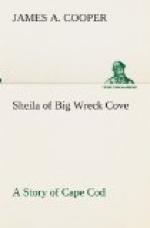The girl opened the oven door to view briefly the two pans of biscuit.
“They are not even brown yet, Aunt Prue. But soon.”
“The creamed fish is done. I hope you like salt fish, Ida May?”
“I adore it!”
“Lucky you do,” put in Cap’n Ira. “I can’t say that I think it is actually ‘adorable.’ But then, I ain’t been eatin’ it as a steady shore diet much more’n sixty-five year.”
“Don’t you run down your victuals, Ira,” said his wife.
“No, I don’t cal’late to. But if I may be allowed to express my likes and dislikes, I got to be honest and say that there’s victuals I eat that would have suited me better for a steady diet than pollack and potatoes. And now we don’t even have the potatoes, ’cause we can’t raise ’em no more.”
“But you have land. I see a garden,” said Ida May briskly.
“Yes, it’s land,” said Cap’n Ira, in the same pessimistic way. “But it ain’t had a coat of shack fish for three years and this spring not much seaweed. Besides that, after the potatoes are planted, who is to hoe ’em and knock the bugs off?”
“Oh!” commented Ida May, with a small shudder.
He grinned broadly.
“There’s a whole lot o’ work to farming. I’d rather plow the sea than plow the land, and that’s no idle jest! Never could see how a man could be downright honest when he says he likes to putter with a garden. Why, it’s working in one place all the time. When he looks up from his job, there’s the same old reefs and shoals he’s been beatin’ about for years. No matter how often he shoots the sun, the computation’s bound to be just the same. He’s there, or thereabout.”
“That’s the way with most longshoremen, Ida May,” said Prudence, sighing. “They make awful poor farmers if they are good seamen. Can’t seem to combine the two trades.”
“I cal’late that’s so,” agreed Cap’n Ira, his eyes twinkling. “They’d ought to examine all the babies born on the Cape first off, and them that ain’t web-footed ought to be sent to agricultural school ’stead of to the fishing. But that ain’t why our potato crop’s a failure this year. And as far as I see, talking won’t cure many fish, either.”
“Can’t I help?” asked Ida May in her gentle voice. “You know, I’ve come here to work. I don’t expect to play lady.”
“Well, I don’t know. It ain’t the kind of work you are used to.”
“I’ve been used to work all my life, and all kinds of work,” interposed the girl bravely.
“But you seem so eddicated,” Prudence said.
“Getting an education did not keep me from learning how to use my hands.”
“Well, Sarah Honey was a right good housekeeper,” granted Prudence.
At that the girl fell suddenly silent, as she did whenever Sarah Honey’s name was mentioned. And yet she knew she must get used to such references to her presumed mother. Prudence frequently recalled incidents which had happened when Sarah Honey visited the Ball house before she was married.




